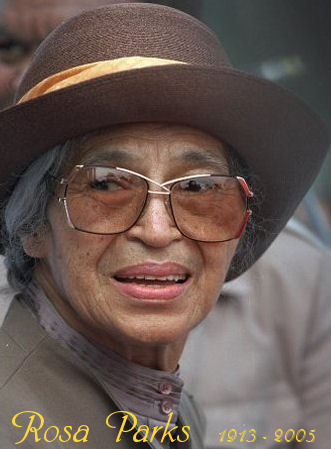
|
|

|
|
December 1, 1955. A bus stop in Montgomery, Alabama. A seamstress on her way home from work. A seamstress with sore feet. The bus is taking forever. It finally arrives, and she thankfully plops down in a seat, and begins to relax.
A few stops go by. The seamstress gazes out the window, musing about food, and warmth, when she realizes someone is talking to her. It is a man, rudely demanding that she stand up and give him her seat. The man is perfectly fit and quite capable of standing himself, but he is also white, and the seamstress is black, and in Alabama in 1955, it was against the law for her to refuse.
But it had been a long day, and she was tired. Tired of a lot of things. Tired of giving up her seat to rude white men. Tired of being treated as some sort of sub-human. So she ignored the man, and looked back out the window. The bus stopped, and the driver got out of his seat and walked up to her.
"Are you going to stand up?" the bus driver asked.
"No," she answered.
"Well, by God, I'm going to have you arrested," the driver said.
"You may do that," she responded.
So the seamstress was arrested. She was fingerprinted, and put in jail. She phoned her husband. He phoned his minister for advice. His minister was a passionate young man by the name of Martin Luther King Jr.. He was unknown at the time, but that was about to change. He organized a boycott of the busses that lasted over a year. This small local boycott ultimately grew into a nation wide movement for civil rights , that finally culminated in the Civil Rights Act of 1964, banning racial discrimination. And it all started with a seamstress. A seamstress named Rosa Parks.
In a speech 30 years later, Rosa said, "It was just a day like any other day. I had no idea it would turn into this."
Rosa Parks died today, at home, of natural causes. She was 92.

|
|
|